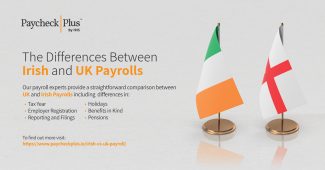
The UK Payroll Guide to Off-Payroll Working Rules (IR35)
UK Payroll Processors impacted by IR35
Despite the UK government announcing that the IR35 reforms for the private sector have been delayed until April 2021 due to the coronavirus pandemic, many uk payroll processors and are preparing to make the relevant changes from April 2020 as previously planned.
The Treasury had originally spoken about the off-payroll reforms being enforced with a ‘light touch’ for the first 12 months, but with payroll processors now being given an extra year to prepare, it’s likely that HMRC will not be as lenient of those who are still ill-prepared or found to be in breach of the rules following implementation in April 2021.
Essentially, the reforms are still on their way and while the delay will help payroll processors who were ill-prepared for the 2020 date, for payroll processors who have invested significant time and money in understanding their obligations under the revised off-payroll rules, it is prudent to continue as planned to ensure your risk of financial penalty is reduced in 2021.
WHAT IS IR35?
IR35 is the term given to two pieces of tax legislation, aimed at combatting tax avoidance by workers and the companies hiring them. Also known as ‘off payroll working’, it is designed to tackle ‘disguised’ employment whereby contractors and their hirers take advantage of the tax efficiency of working through a limited company or personal services company when in fact the worker should be employed directly by the client for whom they are working and treated as an employee.
‘Disguised employment’ can result in significant savings for the engaging organisation through the avoidance of employers’ NICs (13.8%) and the Apprenticeship Levy (0.5%). From an employment law perspective, it also means they do not have to offer any employment rights or benefits, including auto-enrolment workplace pensions.
IR35 became law on 6 April 2000 and reforms to IR35 were introduced in April 2017 for those working in the public sector. More recently Chancellor Rishi Sunak confirmed that the IR35 legislation will be extended to the private sector from 6 April 2021.
DOES THIS LEGISLATION APPLY TO MY ORGANISATION?
The new legislation does not impact all UK Payroll Processors as it is only applicable if two or more of the following conditions are met:
- Your business has an annual turnover of more than £10.2 million;
- Your business has a balance sheet total of more than £5.1 million;
- Your business has more than 50 employees.
How can we ensure we comply with IR35 legislation?
The first task for any payroll processor concerned about limited company contractors claiming off-payroll status is to complete a Status Determination Statements (SDS). Determinations are made through the online HMRC curated CEST tool which can be found here.
Essentially, this tool considers a number of conditions that must be met in order for a contractor to be deemed outside IR35, including:
- Independence/control – for a contractor to be outside of IR35, they must be able to work unsupervised, with little direct control from you (the client). What’s more, consultants must not be treated as employees and should not receive the same benefits as employees.
- Right of substitution – if the contractor is unable to do the work, they should be able to provide a substitute, with no right of veto from you. Essentially, they should be able to substitute someone else to complete the work.
- No exclusivity – the contractor should be able to work for multiple companies/organisations; you should not be able to demand exclusivity.
- No mutuality of obligation – for a contractor to work outside of IR35, there should be no obligation on either their part or that of the engaging company to provide any services outside of the agreed contract. What’s more, once the contract is complete, there is no obligation for the client to offer the contractor further work, nor for the contractor to accept any other work offered.
- Financial risk – any financial risk associated with the contracted work should be borne by the contractor.
If, having completed the CEST checks, a contract is considered to fall within IR35, you will need to treat the payment to the contractor as if it were a PAYE payment and deduct income tax and NI. The contractor can then pay the net amount to the worker with no additional tax liability arising.
How will this affect payroll managers and payroll processors?
The payroll department, and in particular, payroll managers and payroll processors, can play an important role in determining whether contracted workers claiming ‘off payroll’ status should be considered employees and treated accordingly.
The first step should be for the payroll manager or payroll processor to identify any limited company or personal services company consultants or contractors currently invoicing the organisation directly.
The next stage would be for the payroll manager or payroll processor to complete the CEST checks with the contractor to ascertain their status. This should be done with the full knowledge and agreement of the contractor.
If, as a result of the CEST checks, the payroll manager or payroll processor determines that the contractor is ‘outside IR35’, they must then document their decision-making process to demonstrate that “reasonable care” was taken during the exercise. If the payroll manager or payroll processor is found to have not exercised reasonable care, the status determination statement will be invalid, and your organisation will be liable for the unpaid taxes plus potentially fines for late payment.
If the contractor is found to be ‘inside IR35’ they will no longer be eligible for ‘off payroll’ payments. Instead, the payroll manager or payroll processor should discuss the possibility of full employment, whereby they are paid via PAYE and tax and NICs deducted at source. Alternatively, an umbrella company could be used (who will also make tax and deductions at source) or a ‘deemed employment payment’ could be made, whereby the pay rate is the income of the worker after deductions, including both employee and employer NICs and the Apprenticeship Levy. In this latter example, employment rights and auto-enrolment payment schemes do not apply.
For More on UK Payroll and UK Payroll Legislation Read:
How can an outsourced UK payroll company help?
As a specialist outsourced UK payroll company, Paycheck Plus can advise you on the IR35 legislation, and guide your organisation through the status determination process. Our UK outsourced payroll service can help you to mitigate your risk of invalid status determination, thereby ensuring you are not liable for unpaid taxes or fines for late payment. Should we identify any contractors who are no longer eligible for off-payroll treatment, our UK payroll company can help to calculate and process their payroll data, auto enrolment and exemptions, as well as issuing payslips and completing any end of year administration. If your employees require assistance managing childcare vouchers, SMP, SSP, student loans, taxation of benefits and other payroll elements unique to the UK, our UK payroll company experts are on hand to provide support and to guide you through your responsibilities as an employer in the UK, ensuring you’re compliant and helping you to avoid financial penalties.
If you would like some help or advice on navigating the IR35 legislation call our payroll company on (0)1 905 9400 or request a callback today. Our award-winning team of global payroll providers keep up to date with ever evolving legislation to deliver employee wages in an accurate timely and compliant manner.



